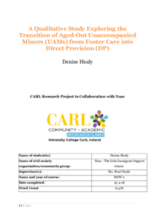Displaying 1261 - 1270 of 2222
This paper uses person-centered latent class analysis (LCA) methods to examine the relationship between different profiles of ACE exposures and divergent health trajectories amongst this high-risk population.
The primary aim of the current study was to examine the longitudinal effects of ongoing physical abuse on the co-development of externalizing behavior problems and posttraumatic stress (PTS) symptoms among child welfare-involved adolescents.
This study presents longitudinal analyses of the case flow of youth aged 3–17 in Washington State's foster care system, tracking rates of screening, scoring above or below clinical criteria cutoff scores, and service receipt.
In this project, researchers provided foster parents with a trauma-informed, evidence-based parenting program (Incredible Years; IY) and assessed its impact on child behavior, foster parent stress and attitudes, and perceived effect on parenting.
This is a small-scale study examining the experiences of Aged-Out Unaccompanied Minors (UAMs) who transition from foster care into Direct Provision (DP) in Ireland.
The researchers in this study conducted a systematic review with the aim of developing a better understanding of the psychosocial factors associated with the behavioral health of children in foster and kinship care.
The current study examined how to best facilitate a healthier professional relationship between case managers and foster families with the goal of identifying concrete ways to improve the relationship and drive foster parent retention.
The authors of this paper conducted a systematic review with the aim of developing a better understanding of the psychosocial factors associated with the behavioral health of children in foster and kinship care.
The current study examines the relationship between foster mothers' parenting stress and coparenting relationship quality, and the moderating influence of foster caregiver role support.
The goal of this study was to investigate the levels of disagreement on adolescent mental health symptoms among caregivers and adolescents in foster care, to examine factors associated with caregiver–adolescent discrepancies, and the potential moderating role of caregiver–child closeness on the link between the length of time the youth lived with caregivers and discrepancies regarding adolescent mental health symptoms.

